By Marc Cammack
Writer Marc Cammack gives AmmoLand readers some history on the prestigious M1 Carbine Family .
If you like this article be sure and read Tom Mchale’s review of the M1 Carbine Rifle.
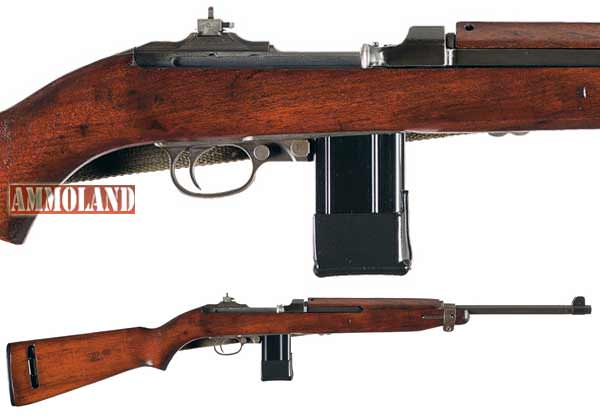

Bangor, Maine -(Ammoland.com)- Prior to America’s entry into World War Two the United States Army realized that a light rifle was needed.
The .45 1911 pistol was thought to be inadequate as a weapon for non-combat personnel, and the standard M1 Garand rifle was too heavy and cumbersome to carry with other equipment.
The M1 Carbine was designed primarily to offer noncombat and line-of-communications troops a better defensive weapon than a pistol or submachine gun.
M1 Carbine Family Creation
The Ordnance Department under Rene Studler, began to seriously search for such a weapon in 1940. The weapon had to be effective out to 300 yards, and it had to weigh about 5 pounds. The cartridge for this new weapon was a .30 caliber pistol round developed by Winchester and the Ordnance Department. The new .30 caliber round was based on an older Winchester round called the .32 caliber Self-loading round.

Several companies and designers submitted light rifle designs including Savage, H&R, and John Garand. The design that would ultimately be adopted by the US government came from Winchester. The half brother of John Moses Browning, Jonathan Edmund Browning had been working on a .30-06 semi automatic rifle for the military before he died in 1939. A former Moonshiner named David Marshall Williams was hired to improve the weapon after the death of Browning. Williams had previously served time in prison for the murder of a Deputy in North Carolina, who had made a raid on his whiskey operation.
Williams redesigned the rifle with his own short stroke gas piston, which resulted in a rifle called the Winchester G30 in .30-06, it was tested by the Marines in 1940, but ultimately was found to be unsatisfactory. When the chance arose for a lightweight rifle, a team at Winchester under Edwin Pugsley, was tasked with scaling down the G30 to the .30 Carbine round. The first prototype was completed within 13 days, by the Winchester team.
After approval from Rene Studler, a team at Winchester began to work on a 2nd prototype. This 2nd prototype was to be completed by September 15th, 1941. David Williams became part of the team which worked on the 2nd prototype, and it was this weapon that became adopted by the US military as the .30 Caliber M1 Carbine. The M1 Carbine unlike the M1 Garand, was fed from detachable 15 round box magazines, and weighed about 5.5 pounds.
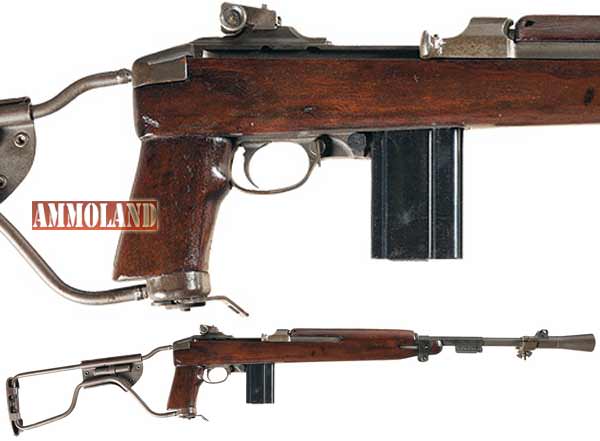
M1 Carbine Mass Production
Despite the fact that Winchester submitted the design, it was the Inland Division of General Motors that produced the largest number of M1 Carbines. Some sources state that the number of Inland carbines of all types (M1, M1A1 M2, M3, etc.) was 2.4 million and others state that the number was about 2.6 million carbines. Inland was also the only company to produce the M1A1 Carbine which was made for paratroopers. The M1A1 carbine featured a wire folding stock for compact storage.
The total production of the M1A1 Carbine is estimated in the neighborhood of 140-150,000 carbines. After World War Two many M1A1 Carbines were reworked and had their stocks replaced, and today surviving M1A1 Carbines fetch a large premium.
There were a total of 10 companies that made M1 Carbines for the US government including Winchester and Inland. Many of these companies seem like unlikely manufacturers, as they made things like typewriters, or jukeboxes. The other eight companies were Underwood, Rockola, Quality Hardware, IBM, National Postal Meter, Standard Products, Saginaw Steering of General Motors, and Saginaw Steering’s Grand Rapids Plant. Irwin Pedersen also made a small number of Carbines, none of which were accepted by the government due to sample Carbines not passing government endurance tests. Because of this the Saginaw Steering Grand Rapids plant was given a contract to make M1 Carbines.
Not every company producing the M1 Carbine made their own barrels. These companies were Quality Hardware, Standard Products, National Postal Meter, and Irwin Pedersen. They had barrels made by other Carbine manufacturers such as Inland, and in some cases barrels made by companies that did not make M1 Carbines like Buffalo Arms, or Marlin. Other parts for the M1 Carbine were made both by the manufacturer and by many subcontractors. For example Auto Ordnance produced receivers for both IBM, and Saginaw. Springfield Armory also made replacement Carbine barrels from 1950 until 1954.
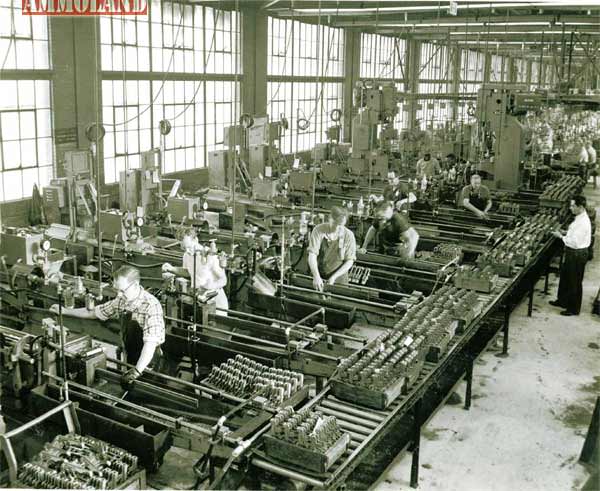
The M1 Carbine was intended as a weapon for non combat personal, vehicle crewmen, and other troops who couldn’t carry a full sized rifle. Despite this many frontline infantrymen carried the weapon and it became the most widely manufactured American small arm of World War Two, with over six million M1 Carbines were produced by the time production ceased in August, 1945. The M1 Carbine saw action in many battles during World War Two, and was even used by German troops who captured the weapons from American soldiers.
M1 Carbine Later Models
Most M1 Carbines that were used in World War Two, featured a flip sight and a push button safety. Later M1 Carbines featured an adjustable rear sight, and a rotating safety. Earlier push button safeties could be mistaken for the magazine release under stress. Also added later was a bayonet lug. The M1 Carbine had its own bayonet designated the M4 bayonet. The M4 bayonet was based off of the M3 Fighting knife and was made starting in 1944 with a leather handle. Later M4 bayonets had plastic handles starting in 1953. Many M1 Carbines were later rebuilt and had bayonet lugs, adjustable sights, and rotating safeties installed.

In late 1944, a selective fire M1 Carbine was adopted and designated the M2. The M2 featured a 30 round magazine, and was only produced by Winchester and Inland. Estimates vary of just how many M2 Carbines were made, but Inland made the vast majority of M2 Carbines. The M2 Carbine was widely used in the Korean War, and had a less than stellar reputation. The M2 Carbine had a lot of muzzle climb and was not well liked by many troops.
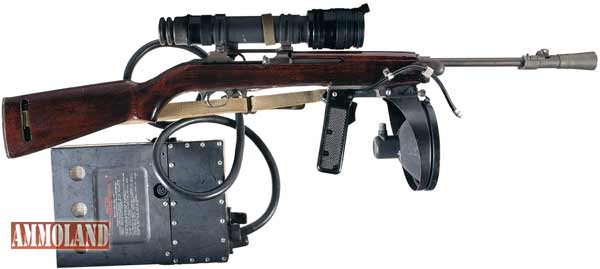
Late in World War Two a version of the Carbine was made for fighting at night. The M3 Carbine was fitted with an infrared scope. The infrared scope is large and heavy by today’s standards but for 1945 it was quite advanced. These early scopes were effective only out to 100 yards, but for the Carbine this was enough. Some of these M3 Carbines were used at the Battle of Okinawa in 1945, against the Japanese. Later versions of the infrared scope were used in the Korean War as well.
The M1 Carbine family has a controversial reputation as being a poor man stopper, and as an unreliable weapon. Most of this reputation came during the Korean War, where Carbines failed to function in harsh cold temperatures. Some said that the Carbine’s round lacked the range or power to stop Chinese or North Korean troops. Others praised the M1 Carbine such as John George author of the book “Shots Fired in Anger: A Rifleman’s View” a recount of the war in the Pacific during World War Two. George thought the carbine was a perfect weapon due to its weight, for fighting in the jungles. Medal of Honor winner Audie Murphy, was also fond of the M1 Carbine. In the 1960’s,the NYPD Stakeout squad, found the M1 Carbine to be an effective weapon when used with soft point ammunition.

Both the M1 and M2 Carbine were used widely after World War Two. The US military used them until the early part of the Vietnam War. Allies of the United States used the Carbine widely during and after World War Two. The French used M1 Carbines alongside their MAS-36 bolt action rifle in the Indochina (Vietnam) Conflict of 1945-1954, and the South Vietnamese Army used them during the Vietnam War. Carbines were also provided to West Germany, Israel, South Korea, and many other countries.
M1 Carbine Family Today
In the 1960’s several M1 Carbines were released for sale by the NRA to the general public. Also several companies made commercial Carbines such as Plainfield, National Ordnance, Universal, and Iver Johnson. The m1 Carbine Today USGI M1 Carbines are highly sought after and command big prices. The supply of USGI M1 Carbines has also dried up. As a result both Auto Ordnance, and the commercial Inland Mfg. make reproduction M1 Carbines for the shooting public.
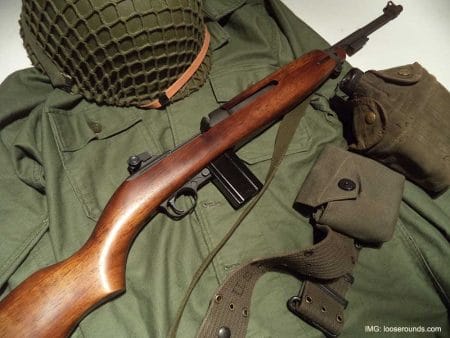
** Images: Rock Island Auction Company ( www.rockislandauction.com )
M1 Carbine Rifle How does it shoot?
About Marc Cammack:
Marc Cammack has been collecting firearms since he was 14 years old.
His interests are primarily military surplus firearms of the late 19th into the 1950’s. He has studied these in depth, and currently volunteers at two local museums providing them with accurate information about their firearms.
He is a graduate of the University of Maine with a bachelor’s degree in history. He has studied modern European and American history since the age of 9, and has been shooting since the age of 11. He currently resides just outside of Bangor, Maine.
